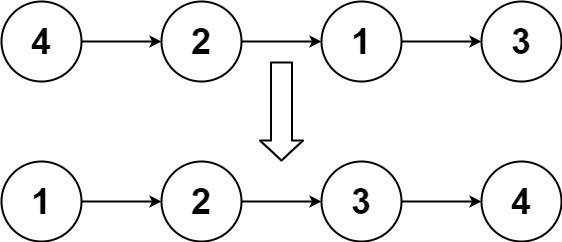LeetCode-in-All
148. Sort List
Medium
Given the head of a linked list, return the list after sorting it in ascending order.
Example 1:

Input: head = [4,2,1,3]
Output: [1,2,3,4]
Example 2:

Input: head = [-1,5,3,4,0]
Output: [-1,0,3,4,5]
Example 3:
Input: head = []
Output: []
Constraints:
- The number of nodes in the list is in the range
[0, 5 * 104]. -105 <= Node.val <= 105
Follow up: Can you sort the linked list in O(n logn) time and O(1) memory (i.e. constant space)?
To solve the problem of sorting a linked list, you can use the merge sort algorithm, which is suitable for linked lists because it provides an O(n log n) time complexity. This approach can be implemented recursively and achieves the required efficiency.
Here are the detailed steps and the corresponding implementation using the Solution class:
Steps:
- Base Case:
- If the linked list is empty or has only one node, it is already sorted. Return the head.
- Split the List:
- Use the fast and slow pointer technique to find the middle of the linked list. This will help to split the linked list into two halves.
slowmoves one step at a time, whilefastmoves two steps at a time.- When
fastreaches the end,slowwill be at the middle point of the list.
- Sort Each Half:
- Recursively sort the left half and the right half of the list.
- Merge the Sorted Halves:
- Merge the two sorted halves into a single sorted list.
Implementation:
class ListNode:
def __init__(self, val=0, next=None):
self.val = val
self.next = next
class Solution:
def sortList(self, head: ListNode) -> ListNode:
if not head or not head.next:
return head
# Step 2: Split the list into two halves
mid = self.getMid(head)
left = head
right = mid.next
mid.next = None
# Step 3: Sort each half
left = self.sortList(left)
right = self.sortList(right)
# Step 4: Merge the sorted halves
return self.merge(left, right)
def getMid(self, head: ListNode) -> ListNode:
slow = head
fast = head
while fast.next and fast.next.next:
slow = slow.next
fast = fast.next.next
return slow
def merge(self, list1: ListNode, list2: ListNode) -> ListNode:
dummy = ListNode()
tail = dummy
while list1 and list2:
if list1.val < list2.val:
tail.next = list1
list1 = list1.next
else:
tail.next = list2
list2 = list2.next
tail = tail.next
if list1:
tail.next = list1
if list2:
tail.next = list2
return dummy.next
Explanation:
- Base Case:
- The function
sortListchecks if the list is empty or has a single node, in which case it returns the head as it is already sorted.
- The function
- Split the List:
- The
getMidfunction finds the middle of the list using the fast and slow pointer technique. - The list is then split into two halves:
leftstarting from the head to the middle, andrightstarting from the node after the middle.
- The
- Sort Each Half:
- The
sortListfunction is called recursively on both halves to sort them.
- The
- Merge the Sorted Halves:
- The
mergefunction merges the two sorted halves into a single sorted linked list. - A dummy node is used to simplify the merging process, and a
tailpointer is used to build the new sorted list.
- The
This approach ensures that the linked list is sorted in O(n log n) time complexity, which is optimal for this problem. The space complexity is O(log n) due to the recursion stack.

